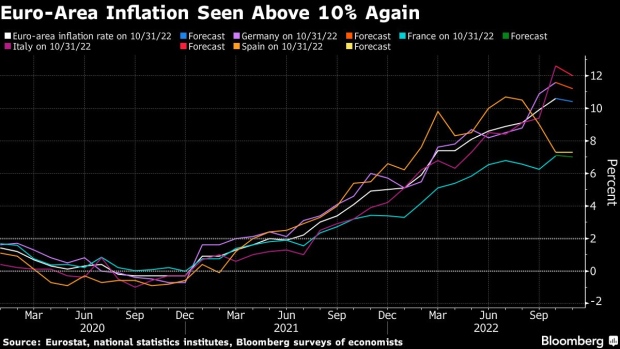Nov 26, 2022
Euro Zone’s Double-Digit Inflation Is Reckoned to Have Lingered
, Bloomberg News

(Bloomberg) -- The euro zone probably endured a second month of double-digit inflation in November, according to analyst forecasts before crucial data awaited by European Central Bank officials.
While the overall pace of consumer-price increases is likely to have slowed for the first time in 1 1/2 years, it still stayed above 10%, almost all economists predict. The median of 32 estimates in a Bloomberg survey is for an outcome of 10.4% in the report due Wednesday.
“Both headline and core inflation are likely at, or close to, their peaks,” Marco Valli, Loredana Maria Federico and Tullia Bucco, economists at UniCredit in Milan whose forecast matches the median, said in a report. “We expect disinflation to start early next year.”
The data are pivotal for the ECB as the most up-to-date headline indicator of price pressures before the Dec. 15 decision, and as an input to forecasts policymakers will consider at that meeting.
Officials have signaled that an unexpected surge may push them to deliver a third consecutive 75 basis-point interest-rate hike, while signs of weakening could help a consensus form toward a smaller step.
Recalling a string of “negative surprises” from such numbers in the past, ECB Vice President Luis de Guindos told Bloomberg Television this month that he reckons inflation isn’t about to subside quickly.
“Over the next months, inflation is going to be hovering around the present level, that is a little bit above 10%,” he said.
There’s a range of a full percentage point between the highest and lowest predictions in the Bloomberg survey.
Pantheon Macroeconomic Advisers Ltd is the sole forecaster anticipating a reading below 10%, while SMBC Nikko Securities Inc. economist Yoshimasa Maruyama expects another acceleration to 10.9%, which would be the fastest in the history of the euro.
What Bloomberg Economics Says...
“The headline rate should cool in November from a record high. But that won’t offer the ECB the reassurance it needs.”
--For the full report, click here.
So-called core inflation, which strips out volatile elements such as energy and food, probably stayed unchanged at 5%. The measure is closely watched too by officials as a gauge of underlying momentum.
The euro-area data mask considerable divergences across the region. Also due this week are the latest consumer-price index reports from the region’s four biggest economies, of whom Germany currently has the fastest inflation. All but Spain are expected by economists to show slowing.
ECB Chief Economist Philip Lane, in an interview with Market News, highlighted how different energy regimes influence national data. Spain’s earlier adjustment to higher prices means inflation has already been weakening there, and others will follow, he said.
“Sooner rather than later, the accumulated pass-through will convert into downward pressure,” he said. “But let’s see whether the peak turns out to be this side of Christmas or the other.”
--With assistance from Joel Rinneby.
©2022 Bloomberg L.P.





